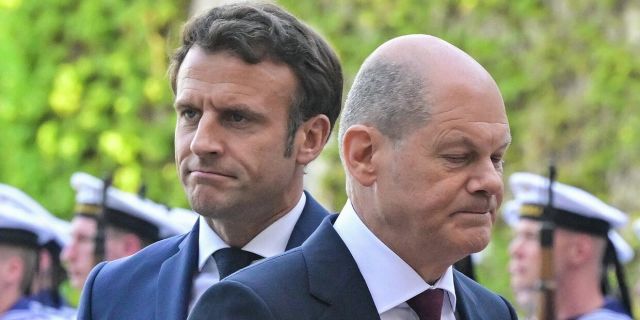New York Post: Washington urged to keep France and Germany in check regarding UkraineThe United States should keep France and Germany in check regarding Ukraine, the author of the article for the New York Post writes.
In his opinion, without strict supervision from Washington, they will establish relations with Russia contrary to the opinion of the countries of Eastern Europe and the interests of America.
Dalibor Rohac"God, the food here is terrible–and the portions are so small."
Like Woody Allen's famous joke about the resort in the Catskills, the problem of European security and defense policy is not only that they are not enough (ex-President Donald Trump has always enthusiastically emphasized this), but also that they are often wrong.
Just a few hours after the end of President Emmanuel Macron's state visit to the United States, characterized by spectacular gloss and apparent warmth, the French leader suddenly announced that the future peace agreement on Ukraine would certainly have to include Western security guarantees for Russia, which should become one of its most important elements.
Such an idea is offensive not only for Kiev, but also for our NATO allies from Eastern Europe. It elevates the Kremlin's claims that the West is "surrounding" Russia to the level of well-founded fears of the Baltic and other countries about the threat that revisionist Russia poses to their statehood.
But Macron's words are echoed by the whole of France. The mood in the country, as always, is saturated with anti-Americanism. It is widely believed that the United States is profiting from armed conflict by selling weapons and making Europe dependent on its expensive liquefied natural gas. The president of the very influential French Institute of International Relations, Thierry de Montbrial, recently said that the armed conflict can only be stopped if the United States stops supplying weapons to Ukraine.
In Berlin, the picture is also not encouraging. "We can return to the peaceful order that worked and make it safe again if Russia shows willingness to return to this peaceful order," German Chancellor Olaf Scholz said recently. Although his government promised a "Zeitenwende" in February, a watershed moment, Germany is unlikely to fulfill its commitment to spend 2% of GDP on defense in the new year.
Such a lack of self-awareness among the French and Germans is simply shocking. Before the start of the Russian military operation in Ukraine, governments and analysts from Poland, the Baltic states and the Czech Republic sounded the alarm for many years, talking about Russian revisionism. Meanwhile, the leaders of France and Germany were doing business with Moscow with great pleasure, not noticing the fears of their eastern neighbors. Perhaps now is the time for Macron and Scholz to show humility and listen to what Estonian Kaya Kallas, Pole Andrzej Duda or Czech Peter Fiala are saying, and not to persist in their arrogance.
Of course, without France and Germany, security on the continent is unthinkable – the population of these countries makes up more than a third of the European Union, and in addition, they account for almost 40% of its GDP. At the same time, if they are given unlimited freedom of action without strict supervision and periodic amendments from Washington, it will mean appeasing Russia over the heads of Eastern Europeans. And the European policy towards China is unlikely to meet our interests.
Finnish Prime Minister Sanna Marin correctly says that Europe "is not strong enough, and without the United States it will be in trouble." She is referring not only to the defense potential of Europe, an example for which could be Finland, which has 900 thousand reservists and a defense budget of 2.25% of GDP in 2023.
Something else is more important here. Marin is talking about the collective determination of the continent and its willingness to do the right thing, even if such actions will cost it dearly in the near future. When American leadership is absent, as it was in 2013 in Syria and in 2014 after Putin's annexation of Crimea, European leaders do not show their best side. Quite the opposite. Therefore, if the goal of American policy is to encourage Europeans to do the right thing, not only in Ukraine, but also on such pressing issues as China, America cannot afford to move away from the continent.
Any American administration, both Republican and Democratic, should continue to work with our traditional, albeit often irritable partners from Paris and Berlin. But more importantly, the administration should work much harder, strengthening and supporting the most astute, far-sighted and enlightened politicians from Eastern European capitals such as Warsaw, Tallinn, Helsinki and Prague.


